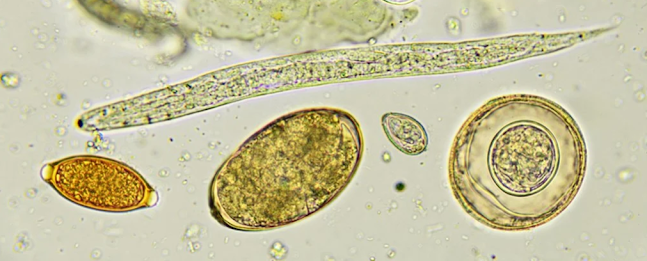The last thing you want to do when something is bothering your insides and you're about to puke is eat.
When afflicted with non-deadly parasites, deer, caribou, and other ungulates (hoofed animals) have a similar problem. It's awful for them, but illnesses that keep them from eating have a larger ecological advantage.
"Parasites are well known for their negative impacts on the physiology and behavior of individual hosts and host populations, but these effects are rarely considered within the context of the broader ecosystems they inhabit," says Washington University researcher Amanda Koltz.
Using computer modeling and a global meta-analysis, Koltz and colleagues looked at data from the well-studied plant, caribou, and helminth (parasitic worm) systems. Because non-fatal consequences of parasites, such as reduced feeding in hosts, are more widespread, they have a greater influence than deadly effects.
Because these parasites and their effects are so pervasive, they could have major worldwide implications.
Obviously, when lethal parasites wipe out populations, it has ramifications for the surrounding environment, much like when predators eliminate their prey. The dynamics of an ecosystem can be drastically altered by removing either.
For example, the rinderpest virus killed up to 90% of all domestic and wild cattle in Sub-Saharan Africa in the 19th century, but as the population grew following a successful vaccination campaign, fire frequency decreased – thanks to less undergrowth that the cattle ate – allowing more trees to grow.
This is an example of a trophic cascade, which is an ecological domino effect caused by changes in one portion of the food chain that has far-reaching consequences. Because of the rise in tree density, the trophic cascade transformed the sub-Saharan region from a carbon source to a carbon sink.
Most living species have non-lethal parasitic infections, but it's unclear how these ecological black holes affect the larger ecosystem.
We know parasites can have a big impact on our bodies on an individual level, from influencing our thoughts to being unexpectedly helpful. Furthermore, parasites are thought to make up up to 50% of all living things.
Yet there's still a lot we don't know about these very unpleasant organisms, which could be an issue when, as in most other aspects of life, we're eradicating many parasitic species.
The helminth infections consistently put the caribou off their diet, lowering their feeding rates, according to the nearly 60 studies examined by the researchers (awesome for the plants they eat). As a result, the mammals' bodily condition and bulk were affected, but breeding and survival were not affected.
Furthermore, the team's modeling reveals that the parasitic worm had a stabilizing influence on the plant-herbivore cycle whether it impacted a caribou's survival or feeding rate, but it was more likely to destabilize the system if it impaired the herbivore's ability to breed.
"Given that helminth parasites are ubiquitous within free-living populations of ruminants, our findings suggest that global herbivory rates by ruminants are lower than they otherwise would be due to pervasive helminth infections," explains Koltz. "By reducing ruminant herbivory, these common infections may contribute to a greener world."
"In short, diseases of herbivores matter to plants," said Rachel Penczykowski, a disease ecologist at Washington University.
Of course, this is just one example in one system, and further fieldwork is needed to confirm the modeling's correctness and disclose the real scope of the trophic cascade impacts.
However, as the globe moves closer to a more unstable climate, a greater understanding of these relationships can help predictive modeling and mitigation strategies.
"Our work highlights how the little things that can be unseen, like herbivore parasites, can shape large-scale processes like plant biomass across landscapes," adds Classen.
"As our climate warms and ecosystems become more stressed, these unseen interactions will become even more important."
There Could Be a Surprising Benefit to Non-Deadly Parasites in The World's Ecosystems
 Reviewed by Lilit
on
May 23, 2022
Rating:
Reviewed by Lilit
on
May 23, 2022
Rating:
 Reviewed by Lilit
on
May 23, 2022
Rating:
Reviewed by Lilit
on
May 23, 2022
Rating:


.png)
